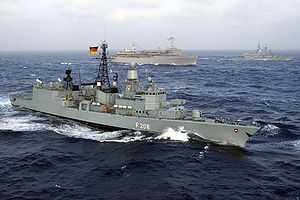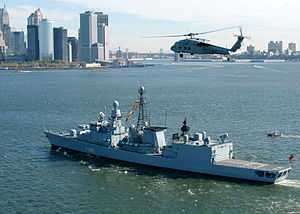Bremen-class frigate
 Frigate F208 Niedersachsen | |
| Class overview | |
|---|---|
| Builders: |
Bremer Vulkan AG Weser Blohm & Voss Nordseewerke Howaldtswerke |
| Operators: |
|
| Succeeded by: | F125-class frigate |
| Completed: | 8 |
| Active: |
Niedersachsen Karlsruhe Augsburg Lübeck |
| Retired: | 4 |
| General characteristics | |
| Displacement: | 3,680 tonnes |
| Length: | 130.50 m |
| Beam: | 14.60 m |
| Draft: | 6.30 m |
| Propulsion: | CODOG (Combined diesel or gas) 2 × MTU 20V956 TB92 diesel engines, 8.14 MW total 2 × General Electric LM2500 gas turbines, 38 MW total 2 × Renk STG 150-50 gearboxes, 10:1 (diesel) and 720:47 (turbine) 2 × propeller shafts, controllable pitch, five-bladed Sulzer-Escher propellers, later replaced with seven-bladed ones from Wegemann & Co. ("Bremen" only) 4 × Deutz MWM diesel-generators, 750 kW |
| Speed: | 30 knots |
| Range: | more than 4,000 nautical miles (7,000 km) at 18 knots |
| Complement: | 202 crew plus 20 aviation |
| Sensors and processing systems: | 1 × EADS TRS-3D air search radar (three-dimensional) 1 × WM 25 combined surface search and fire control radar I/J band 1 × Thales Nederland STIR 180 fire-control radar I/J/K band 1 × Kelvin Hughes Nucleus 5000 I band navigation radar 1 × STN Atlas DSQS-23BZ hull-mounted sonar |
| Electronic warfare and decoys: | ESM/ECM EADS FL 1800S 2 × SCLAR decoys SLQ-25 Nixie torpedo decoy |
| Armament: |
|
| Aircraft carried: | Place for 2 Sea Lynx Mk.88A helicopters equipped with torpedoes, air-to-surface missiles Sea Skua, and/or heavy machine gun. |
The eight F122 Bremen-class frigates of the German Navy were commissioned between 1982 and 1990. The design is similar to the Dutch Kortenaer class but uses a different hull and propulsion system. The ships were built for anti-submarine warfare as a primary task even though they are not fitted with towed array sonars. They are also suited for anti-aircraft warfare and anti-surface warfare.
This class of ship was one of the last to be constructed under post-war displacement limitations imposed by the WEU on West Germany.
All eight Bremen-class frigates will be replaced by the planned F125-class frigates, starting probably around 2016. Until then, the Bremen class serves as the backbone of the German Navy.[1]
Employment
During the Cold War period, the ships' main war task was to escort convoys for reinforcement and resupply of Allied forces in Europe. They frequently took part in NATO Standing Naval Forces. Since 1990, all ships have served in additional supporting missions such as the embargo operations against former Yugoslavia in the Adriatic Sea or Operation Enduring Freedom against the international terrorism.
During their lifetime, the ships' equipment has frequently been modernised and a further adaptation of combat systems is foreseen in the near future.
Notable actions
The Karlsruhe successfully assisted an Egyptian freighter repel pirates on December 25, 2008 in the Gulf of Aden.
In 2012 the Rheinland-Pfalz was reportedly used to gather intelligence on Syrian troop movements to be passed to the Free Syrian Army assist in their attacks on the Syrian Army.[2]
Ships
| Pennant | Name | Call sign |
Laid down | Shipyard | Launched | Delivered | Commissioned | Decommissioned |
|---|---|---|---|---|---|---|---|---|
| F207 | Bremen | DRAQ | July 9, 1979 | Bremer Vulkan | September 27, 1979 | May 7, 1982 | March 28, 2014 | |
| F208 | Niedersachsen | DRAR | November 9, 1980 | AG Weser | June 9, 1980 | October 15, 1982 | ||
| F209 | Rheinland-Pfalz | DRAS | September 25, 1979 | Blohm & Voss | September 3, 1980 | May 9, 1983 | March 22, 2013[3] | |
| F210 | Emden | DRAT | June 23, 1979 | Nordseewerke | December 17, 1980 | October 7, 1983 | November 29, 2013 | |
| F211 | Köln | DRAU | June 16, 1980 | Blohm & Voss | May 29, 1981 | October 19, 1984 | July 31, 2012[4] | |
| F212 | Karlsruhe | DRAV | March 10, 1981 | Howaldtswerke | January 8, 1982 | April 19, 1984 | ||
| F213 | Augsburg | DRAN | April 4, 1987 | Bremer Vulkan | September 17, 1987 | October 3, 1989 | ||
| F214 | Lübeck | DRAO | June 1, 1987 | Nordseewerke | October 15, 1987 | March 19, 1990 |
All ships are based in Wilhelmshaven. Together they form the 4. Fregattengeschwader (4th Frigate Squadron) of the German Navy.
Gallery
-

Frigate F207 Bremen
-

F208 Niedersachsen in New York, 2004
-

Frigate F211 Köln
-

Frigate F209 Rheinland-Pfalz
-

Frigate F214 Lübeck
-

Frigate F207 Bremen at Portsmouth, UK, 2013.
-

Frigate F207 Bremen at Portsmouth, UK, 2013.
-

Frigate F207 Bremen at Portsmouth, UK, 2013.
-

Frigate F207 Bremen at Portsmouth, UK, 2013.
-

Frigate F210 Emden at Portsmouth, UK, 2013.
-

Frigate F210 Emden at Portsmouth, UK, 2013.
-

Frigate F210 Emden at Portsmouth, UK, 2013.
-

Frigate F210 Emden at Portsmouth, UK, 2012.
References
- ↑ Fiorenza, Nicholas (24 October 2011). "More Details Of German Cuts". Ares: A Defense Technology Blog. Aviation Week. Retrieved 12 May 2012.
- ↑ Reuters (Aug 19, 2012). "Syria rebels aided by Germany intel ship in fight against Assad forces, report says". Haaretz. Retrieved 20 Aug 2012.
- ↑ "Kein Abschied für immer". 2013-03-22. Retrieved 2013-06-07.
- ↑ "Fregatte Köln: Ein letztes Kölsch zum Abschied". Express.de. 2012-08-01. Retrieved 2013-02-22.
Sources
- Website for all active and retired Frigate F213 Seamen
- "Fregatte BREMEN-Klasse" (in German). Deutsche Marine. Retrieved 4 August 2008.
- naval-technology.com
- http://www.nytimes.com/2008/12/26/world/africa/26pirates.html?ref=world
- http://news.bbc.co.uk/2/hi/africa/7799796.stm
External links
-
 Media related to Bremen class at Wikimedia Commons
Media related to Bremen class at Wikimedia Commons
| ||||||||||||||
| ||||||||||||||||||||||||||||||